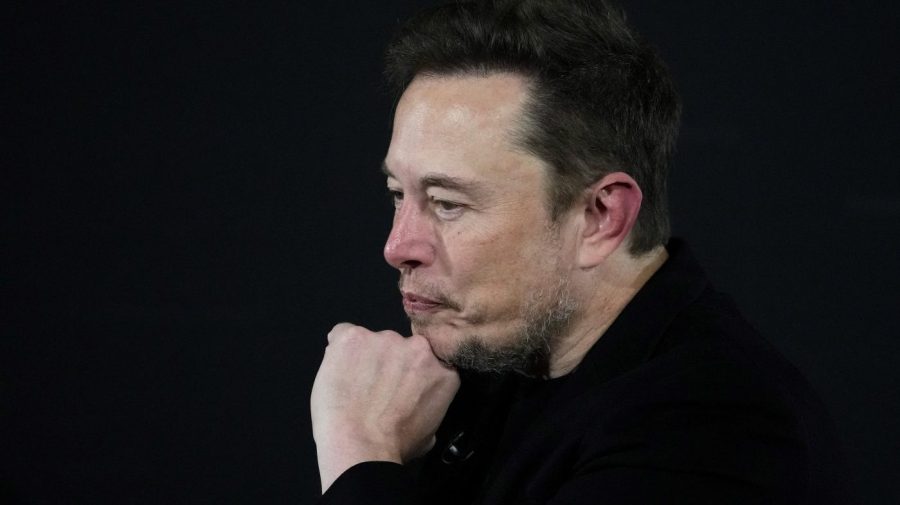Business
Musk told advertisers to ‘go f— yourself’ and stop spending on X. They might do just that. on December 7, 2023 at 11:00 am Business News | The Hill

Elon Musk’s recent expletive-laden outburst at major advertisers on X, the platform formerly known as Twitter, was the latest in a long line of controversial remarks from the billionaire tech mogul.
However, Musk’s comments may have gone too far for advertisers this time, who experts warned may opt not to continue spending on the platform.
“I think the era of advertising is true well and truly dead at Twitter, at X,” said Lou Paskalis, the CEO and founder of the marketing consultancy AJL Advisory.
Several major companies — including Disney, Apple, IBM, Comcast, Lionsgate, Warner Bros. Discovery, Sony Pictures and Paramount — paused their ad spending on the platform en masse last month as Musk faced renewed accusations of antisemitism.
The pullback started after Musk appeared to endorse an antisemitic conspiracy theory on X in a reply to another user’s post in mid-November, calling it the “absolute truth.”
Just one day later, a report from the left-leaning media watchdog Media Matters for America accused X of placing ads for mainstream brands next to pro-Nazi and white nationalist content.
As advertisers fled, Musk attempted to contain the fallout with a trip to Israel, in which he met with Israeli Prime Minister Benjamin Netanyahu and toured a kibbutz that was attacked by Hamas militants on Oct. 7.
However, upon returning to the U.S., Musk lashed out at major advertisers who had stopped spending on the platform.
“If someone is going to try and blackmail me with advertising, blackmail me with money, go f— yourself,” he said at The New York Times DealBook Summit. “Go f— yourself. Is that clear? Hope it is.
“Hey Bob, if you’re in the audience,” Musk added, in an apparent response to Disney CEO Bob Iger, who earlier in the summit addressed his company’s decision to halt spending on X.
Paskalis suggested that Musk already knew advertisers weren’t going to return to the platform before taking the stage at the DealBook Summit.
“Either out of hubris or a plan that I don’t understand, an end game I really don’t understand, he wanted to put the sword in the beast and say, ‘I don’t care about advertisers. Their concerns don’t concern me. I don’t need you to succeed,’” Paskalis told The Hill.
Advertisers flee as X bleeds money
Musk’s decision to spurn ad money comes after a year of deep financial losses for X, which the billionaire purchased for $44 billion last October.
Advertisers similarly pulled away last year after Musk initially took control of the company and rapidly began making changes. The billionaire fired top executives, laid off thousands of staff and followed through on promises to walk back content moderation policies and reinstate previously banned accounts on the platform.
By the end of November 2022, Media Matters reported that half of Twitter’s top 100 advertisers were no longer spending on the platform, and Musk was warning employees that the company could go bankrupt.
Since Musk’s chaotic takeover, advertisers appear to have slowly returned to X. CEO Linda Yaccarino said in September that 90 percent of the company’s top 100 advertisers were back, although some reports have indicated that ad revenue at X remains well below pre-Musk levels.
Wedbush Securities analyst Dan Ives said he now estimates that the social media company is worth less than $10 billion.
Why Musk’s latest comments are a turning point
Even more so than telling advertisers to “go f— yourself,” Paskalis said that Musk’s decision to publicly call out Iger has companies concerned.
“That is the more concerning thing for corporate America, that he would go so far to call out the CEO of somebody who’s stopped advertising,” he said. “That freezes large companies. It paralyzes them because they never want to put their CEO in any kind of thing that would get them caught up in the middle of the culture war.”
“In that context, if X paid me to advertise on X, if they actually paid a premium, money back to the client, it’s still not worth the reputational risk,” Paskalis added.
Jasmine Enberg, a principal analyst at the marketing research company Insider Intelligence, also said noted that because X is not essential for most advertisers, it is a “relatively painless and easy decision” for companies to cut spending on the platform.
“If it was a platform where advertisers got a strong return on investment, some of them might be more willing to overlook Musk’s antics,” Enberg said.
“But as it stands, X is a very small part of the digital advertising landscape, and there are other platforms and a growing list of other platforms where advertisers can spend their money,” she continued. “So why spend on a platform where the owner has explicitly told them not to.”
With the existence of these additional venues for advertising, Tom Hespos, who runs the consulting firm Abydos Media, said it has been easier for some of his clients to stop spending on the platform.
“Continuing to invest in Twitter when we have other options and they no longer have the clout and the control that they once did, again, the decision becomes a little bit more easy,” he told The Hill.
Hespos has begun recommending that some of his clients stop posting on X, in addition to halting ad spending.
“In the instance where I have a client that maybe hasn’t invested so much in Twitter, X, whatever its calling itself these days, it’s a consideration to pull not just advertising but to get off the platform entirely,” he said.
“Clients do not want to answer the questions surrounding, ‘Why are you supporting somebody who’s posted antisemitic things? Why are you supporting somebody who tells advertisers to f— off?’” he added.
Several major companies that halted ad spending on X seem to have taken a similar approach, with flagship accounts from Lionsgate, Warner Bros. Discovery, Sony Pictures and Paramount going silent in mid-November.
“We’re hitting a tipping point, I think, where the disdain for advertisers and the creation of a safe space for things like hate speech and antisemitism, those aren’t things that advertisers want to support through implied endorsement or any other methods,” Hespos said.
How Musk, X are trying to stay afloat
Amid the storm, X is reportedly working to attract ad spending from smaller and medium-sized businesses. The company told the Financial Times that the effort was “always part of the plan,” but it now plans to “go even further with it.”
Yaccarino has also attempted to attract advertisers with Musk’s “free speech” vision of the platform.
“X is enabling an information independence that’s uncomfortable for some people,” she wrote in a post last week. “We’re a platform that allows people to make their own decisions.”
“And here’s my perspective when it comes to advertising: X is standing at a unique and amazing intersection of Free Speech and Main Street — and the X community is powerful and is here to welcome you,” Yaccarino added. “To our partners who believe in our meaningful work — Thank You.”
However, experts expressed doubts about how effective such an approach will be at countering recent losses.
“Without those big brands, it’s going to be incredibly difficult for X to be able to pay its bills,” Enberg said. “Musk has not yet been able to roll out another sustainable monetization model that would be able to bring in as much revenue as advertising has brought in for the platform.”
While Ives, the Wedbush Securities analyst, acknowledged that X could use smaller businesses to “fill some of the void” left by major advertisers, he emphasized that they can’t replace them.
“I do think there’s going to have to be some olive branch to the advertisers to get them to come back at some point,” he said.
Ives noted that despite the current “groundswell moment,” he’s not entirely sure advertisers are done with the platform.
“On one hand, engagement on X has been, I think, significant,” he said. “Advertisers are focused on engagement, so do they come back slowly? I mean, that’s really that’s going to be the debate.”
“The world has short memories,” Ives added.
Technology, Business, advertisers, Twitter Elon Musk’s recent expletive-laden outburst at major advertisers on X, the platform formerly known as Twitter, was the latest in a long line of controversial remarks from the billionaire tech mogul. However, Musk’s comments may have gone too far for advertisers this time, who experts warned may opt not to continue spending on the platform….
Business
Google Accused Of Favoring White, Asian Staff As It Reaches $28 Million Deal That Excludes Black Workers

Google has tentatively agreed to a $28 million settlement in a California class‑action lawsuit alleging that white and Asian employees were routinely paid more and placed on faster career tracks than colleagues from other racial and ethnic backgrounds.
- A Santa Clara County Superior Court judge has granted preliminary approval, calling the deal “fair” and noting that it could cover more than 6,600 current and former Google workers employed in the state between 2018 and 2024.

How The Discrimination Claims Emerged
The lawsuit was brought by former Google employee Ana Cantu, who identifies as Mexican and racially Indigenous and worked in people operations and cloud departments for about seven years. Cantu alleges that despite strong performance, she remained stuck at the same level while white and Asian colleagues doing similar work received higher pay, higher “levels,” and more frequent promotions.
Cantu’s complaint claims that Latino, Indigenous, Native American, Native Hawaiian, Pacific Islander, and Alaska Native employees were systematically underpaid compared with white and Asian coworkers performing substantially similar roles. The suit also says employees who raised concerns about pay and leveling saw raises and promotions withheld, reinforcing what plaintiffs describe as a two‑tiered system inside the company.
Why Black Employees Were Left Out
Cantu’s legal team ultimately agreed to narrow the class to employees whose race and ethnicity were “most closely aligned” with hers, a condition that cleared the path to the current settlement.

The judge noted that Black employees were explicitly excluded from the settlement class after negotiations, meaning they will not share in the $28 million payout even though they were named in earlier versions of the case. Separate litigation on behalf of Black Google employees alleging racial bias in pay and promotions remains pending, leaving their claims to be resolved in a different forum.
What The Settlement Provides
Of the $28 million total, about $20.4 million is expected to be distributed to eligible class members after legal fees and penalties are deducted. Eligible workers include those in California who self‑identified as Hispanic, Latinx, Indigenous, Native American, American Indian, Native Hawaiian, Pacific Islander, and/or Alaska Native during the covered period.
Beyond cash payments, Google has also agreed to take steps aimed at addressing the alleged disparities, including reviewing pay and leveling practices for racial and ethnic gaps. The settlement still needs final court approval at a hearing scheduled for later this year, and affected employees will have a chance to opt out or object before any money is distributed.
H2: Google’s Response And The Broader Stakes
A Google spokesperson has said the company disputes the allegations but chose to settle in order to move forward, while reiterating its public commitment to fair pay, hiring, and advancement for all employees. The company has emphasized ongoing internal audits and equity initiatives, though plaintiffs argue those efforts did not prevent or correct the disparities outlined in the lawsuit.
For many observers, the exclusion of Black workers from the settlement highlights the legal and strategic complexities of class‑action discrimination cases, especially in large, diverse workplaces. The outcome of the remaining lawsuit brought on behalf of Black employees, alongside this $28 million deal, will help define how one of the world’s most powerful tech companies is held accountable for alleged racial inequities in pay and promotion.
Business
Luana Lopes Lara: How a 29‑Year‑Old Became the Youngest Self‑Made Woman Billionaire

At just 29, Luana Lopes Lara has taken a title that usually belongs to pop stars and consumer‑app founders.
Multiple business outlets now recognize her as the world’s youngest self‑made woman billionaire, after her company Kalshi hit an 11 billion dollar valuation in a new funding round.
That round, a 1 billion dollar Series E led by Paradigm with Sequoia Capital, Andreessen Horowitz, CapitalG and others participating, instantly pushed both co‑founders into the three‑comma club. Estimates place Luana’s personal stake at roughly 12 percent of Kalshi, valuing her net worth at about 1.3 billion dollars—wealth tied directly to equity she helped create rather than inheritance.

Kalshi itself is a big part of why her ascent matters.
Founded in 2019, the New York–based company runs a federally regulated prediction‑market exchange where users trade yes‑or‑no contracts on real‑world events, from inflation reports to elections and sports outcomes.
As of late 2025, the platform has reached around 50 billion dollars in annualized trading volume, a thousand‑fold jump from roughly 300 million the year before, according to figures cited in TechCrunch and other financial press. That hyper‑growth convinced investors that event contracts are more than a niche curiosity, and it is this conviction—expressed in billions of dollars of new capital—that turned Luana’s share of Kalshi into a billion‑dollar fortune almost overnight.
Her path to that point is unusually demanding even by founder standards. Luana grew up in Brazil and trained at the Bolshoi Theater School’s Brazilian campus, where reports say she spent up to 13 hours a day in class and rehearsal, competing for places in a program that accepts fewer than 3 percent of applicants. After a stint dancing professionally in Austria, she pivoted into academics, enrolling at the Massachusetts Institute of Technology to study computer science and mathematics and later completing a master’s in engineering.
During summers she interned at major firms including Bridgewater Associates and Citadel, gaining a front‑row view of how global macro traders constantly bet on future events—but without a simple, regulated way for ordinary people to do the same.

That realization shaped Kalshi’s founding thesis and ultimately her billionaire status. Together with co‑founder Tarek Mansour, whom she met at MIT, Luana spent years persuading lawyers and U.S. regulators that a fully legal event‑trading exchange could exist under commodities law. Reports say more than 60 law firms turned them down before one agreed to help, and the company then spent roughly three years in licensing discussions with the Commodity Futures Trading Commission before gaining approval. The payoff is visible in 2025’s numbers: an 11‑billion‑dollar valuation, a 1‑billion‑dollar fresh capital injection, and a founder’s stake that makes Luana Lopes Lara not just a compelling story but a data point in how fast wealth can now be created at the intersection of finance, regulation, and software.
Business
Harvard Grads Jobless? How AI & Ghost Jobs Broke Hiring

America’s job market is facing an unprecedented crisis—and nowhere is this more painfully obvious than at Harvard, the world’s gold standard for elite education. A stunning 25% of Harvard’s MBA class of 2025 remains unemployed months after graduation, the highest rate recorded in university history. The Ivy League dream has become a harsh wakeup call, and it’s sending shockwaves across the professional landscape.

Jobless at the Top: Why Graduates Can’t Find Work
For decades, a Harvard diploma was considered a golden ticket. Now, graduates send out hundreds of résumés, often from their parents’ homes, only to get ghosted or auto-rejected by machines. Only 30% of all 2025 graduates nationally have found full-time work in their field, and nearly half feel unprepared for the workforce. “Go to college, get a good job“—that promise is slipping away, even for the smartest and most driven.
Tech’s Iron Grip: ATS and AI Gatekeepers
Applicant tracking systems (ATS) and AI algorithms have become ruthless gatekeepers. If a résumé doesn’t perfectly match the keywords or formatting demanded by the bots, it never reaches human eyes. The age of human connection is gone—now, you’re just a data point to be sorted and discarded.
AI screening has gone beyond basic qualifications. New tools “read” for inferred personality and tone, rejecting candidates for reasons they never see. Worse, up to half of online job listings may be fake—created simply to collect résumés, pad company metrics, or fulfill compliance without ever intending to fill the role.
The Experience Trap: Entry-Level Jobs Require Years
It’s not just Harvard grads who are hurting. Entry-level roles demand years of experience, unpaid internships, and portfolios that resemble a seasoned professional, not a fresh graduate. A bachelor’s degree, once the key to entry, is now just the price of admission. Overqualified candidates compete for underpaid jobs, often just to survive.
One Harvard MBA described applying to 1,000 jobs with no results. Companies, inundated by applications, are now so selective that only those who precisely “game the system” have a shot. This has fundamentally flipped the hiring pyramid: enormous demand for experience, shrinking chances for new entrants, and a brutal gauntlet for anyone not perfectly groomed by internships and coaching.
Burnout Before Day One
The cost is more than financial—mental health and optimism are collapsing among the newest generation of workers. Many come out of elite programs and immediately end up in jobs that don’t require degrees, or take positions far below their qualifications just to pay the bills. There’s a sense of burnout before careers even begin, trapping talent in a cycle of exhaustion, frustration, and disillusionment.
Cultural Collapse: From Relationships to Algorithms
What’s really broken? The culture of hiring itself. Companies have traded trust, mentorship, and relationships for metrics, optimizations, and cost-cutting. Managers no longer hire on potential—they rely on machines, rankings, and personality tests that filter out individuality and reward those who play the algorithmic game best.
AI has automated the very entry-level work that used to build careers—research, drafting, and analysis—and erased the first rung of the professional ladder for thousands of new graduates. The result is a workforce filled with people who know how to pass tests, not necessarily solve problems or drive innovation.
The Ghost Job Phenomenon
Up to half of all listings for entry-level jobs may be “ghost jobs”—positions posted online for optics, compliance, or future needs, but never intended for real hiring. This means millions of job seekers spend hours on applications destined for digital purgatory, further fueling exhaustion and cynicism.
Not Lazy—Just Locked Out
Despite the headlines, the new class of unemployed graduates is not lazy or entitled—they are overqualified, underleveraged, and battered by a broken process. Harvard’s brand means less to AI and ATS systems than the right keyword or résumé format. Human judgment has been sidelined; individuality is filtered out.

What’s Next? Back to Human Connection
Unless companies rediscover the value of human potential, mentorship, and relationships, the job search will remain a brutal numbers game—one that even the “best and brightest” struggle to win. The current system doesn’t just hurt workers—it holds companies back from hiring bold, creative talent who don’t fit perfect digital boxes.
Key Facts:
- 25% of Harvard MBAs unemployed, highest on record
- Only 30% of 2025 grads nationwide have jobs in their field
- Nearly half of grads feel unprepared for real work
- Up to 50% of entry-level listings are “ghost jobs”
- AI and ATS have replaced human judgment at most companies
If you’ve felt this struggle—or see it happening around you—share your story in the comments. And make sure to subscribe for more deep dives on the reality of today’s economy and job market.
This is not just a Harvard problem. It’s a sign that America’s job engine is running on empty, and it’s time to reboot—before another generation is locked out.

 Entertainment4 weeks ago
Entertainment4 weeks agoWicked Sequel Disappoints Fans: Audience Verdict on For Good

 Entertainment4 weeks ago
Entertainment4 weeks agoAriana & Cynthia Say They’re in a ‘Non‑Demi Curious, Semi‑Binary’ Relationship… WTF Does That Even Mean?

 News4 weeks ago
News4 weeks agoMexico Bans Dophin Shows Nationwide

 Entertainment4 weeks ago
Entertainment4 weeks agoColombia’s ‘Doll’ Arrest: Police Say a 23-Year-Old Orchestrated Hits, Including Her Ex’s Murder

 Entertainment4 weeks ago
Entertainment4 weeks agoHow The Grinch Became The Richest Christmas Movie Ever

 Entertainment4 weeks ago
Entertainment4 weeks agoMiley Cyrus Is Engaged to Maxx Morando

 Business3 weeks ago
Business3 weeks agoLuana Lopes Lara: How a 29‑Year‑Old Became the Youngest Self‑Made Woman Billionaire

 News4 weeks ago
News4 weeks agoUS May Completely Cut Income Tax Due to Tariff Revenue






























